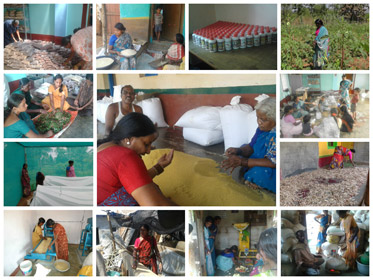GREEN Foundation initiated the formation of Janadhanya, an association of farming community members who are empowered to work collectively to conserve agro biodiversity, provide market linkage for farmer produce and promote organic farming, among many other objectives. They carry the movement for sustainable agriculture forward at a grassroots level. Registered under the Societies Registration Act of 1960, Janadhanya was established in 2006 with a handful of members keen to take the movement forward while consolidating community involvement. Today, the association is active in the Kanakpura area on the outskirts of Bangalore and comprises of nearly 2740 members .
'Jana' in Janadhanya means people and the people of the community make up this farming association. An average five to seven villages comprise what is called a cluster. Representatives of these clusters, who are either nominated or voted in, make up the Board of Directors (BOD) of Janadhanya. Currently, the BOD comprises of 13 members, 12 of whom are women. Chosen representatives of the society meet regularly to monitor, evaluate and carry out the various objectives of the association in conjunction with their communities. They are responsible for the dissemination of information to clusters as well as decision making in the association.
 Mahatma Gandhi was a great visionary who strongly believed that the progress of the country lies in the development of its 7.5 lakh villages, i.e, development of rural economy, rural industries and rural skills. The basic principles of rural development in his view were village Swaraj and swadeshi, and the strategy for rural reconstruction were clearly outlined which contained self sufficiency, bread labour, equity and trusteeship w.r.t natural resources, decentralisation, full employment, small scale industrialisation, Naitalim etc.
Mahatma Gandhi was a great visionary who strongly believed that the progress of the country lies in the development of its 7.5 lakh villages, i.e, development of rural economy, rural industries and rural skills. The basic principles of rural development in his view were village Swaraj and swadeshi, and the strategy for rural reconstruction were clearly outlined which contained self sufficiency, bread labour, equity and trusteeship w.r.t natural resources, decentralisation, full employment, small scale industrialisation, Naitalim etc.
Swadeshi according to Gandhiji,is the moral principle underlying a decentralized self-sufficienteconomic structure, which restricts us to the use and service of our immediate surroundings to the exclusion of the more remote ones, exchanging only such necessary commoditiesto other villages where they are not locally producible. The buyers and sellers having a concernfor each other, jointly work for the development of their local areas using localresources.
Today the country has moved quite away from Gandhiji's vision of development. With today's centralised mass production systems, villagers are virtually thrown out of all kinds of employment and are forced to buy from external economy not only high tech facilities (like pumps, motors, machinery) but even their basic needs (utensils/vessels, construction materials like steel and cement, etc) including agri-inputs like seeds and fertilisers and processed foods like oils etc.
In regions like Kanakapura with a relatively low annual rainfall of ~750 mm and with majority of farmers having no irrigation facility, only single crop is possible in a year, farmers are not employed throughout the year. Villagers need additional employment avenues. In an attempt to create such additional income sources, several producer groups have been initiated, over the last 1-2 years, engaged in activities of small scale agro-processing or agro-input services or value addition and marketing. The positive aspect of these group enterprises is that the members can choose their share of work at their convenience to suit their other house-hold or farming responsibilities. The small scale grain processing units also help local community for self-consumption, otherwise in today's mega scale operations (of the order 4 tons/hr capacity), farmers cannot get small quantities (of dal or oil or rice) processed for themselves, they have to sell their grains and buy the processed product from the urban market.
Janadhanya aims to build strong, mutually beneficial network of relationships within farming communities that will benefit future generations to come, through the following initiatives:
1. Market linkage for local indigenous seeds and farmer produce
2. Promote Organic Farming and Sustainable Agriculture
3. Promotion of PGS, to build trust-worthiness of the farmer produce in the consumers
4. Groom Community Resource Persons(CRPs) who serve as a bridge between Janadhanya and the rural community, to help and lead the community in various livelihood options
5. Linkages between line departments and other institutions with the member groups
6. Alternate income generation programs through producer groups.
 At present there are about 11 producer groups operating, 3 of them in Seed Bank activities, 3 groups in grain processing activities and 3 others in to production of organic inputs and 2 in to nursery production. Couple of other groups are about to be started, one on edible oil milling and other on cattle feed management and there is potential for many more like soap making, sanitary napkins, foot wear etc etc. A small outline on each of the existing producer group is given below.
At present there are about 11 producer groups operating, 3 of them in Seed Bank activities, 3 groups in grain processing activities and 3 others in to production of organic inputs and 2 in to nursery production. Couple of other groups are about to be started, one on edible oil milling and other on cattle feed management and there is potential for many more like soap making, sanitary napkins, foot wear etc etc. A small outline on each of the existing producer group is given below.